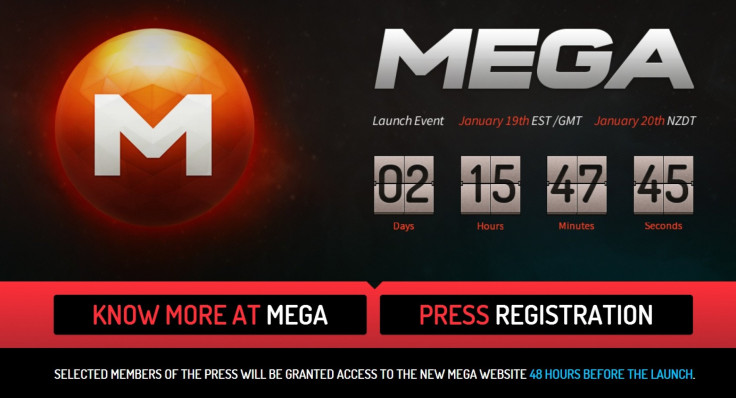Megaupload Filesharing Successor 'Mega' Already Wildly Popular Hours After Launch

Kim Dotcom has launched Mega, an encrypted, secure file-sharing successor to Megaupload.com, which was shut down last year by U.S. authorities who charged him and several other Megaupload leaders with criminal copyright infringement and other counts.
The site went live Saturday at 6:48 a.m. New Zealand time, which was chosen to coincide with the moment the first New Zealand law-enforcement helicopter touched down at the Dotcom mansion there last year. Dotcom was arrested that fateful day, and Megaupload was taken down in one of the largest international copyright cases ever pursued, as indicated by the New Zealand Herald.
Dotcom announced the launch of Mega with the following tweet on his official Twitter account: "As of this minute one year ago #Megaupload was destroyed by the US Government. Welcome to Mega.co.nz"
And it appears the world had been eagerly anticipating its introduction, as Dotcom followed that tweet with another, just 10 minutes later, suggesting how popular it is already turning out to be: "Wow. I have never seen anything like this. From 0 to 10 Gigabit bandwidth utilization within 10 minutes."
A little while later, Dotcom quantified the level of Mega's popularity, as reflected by the rate of sign-ups, with yet another tweet: "Site is extremely busy. Currently thousands of user registrations per minute."
The 38-year-old, who legally changed his name to Kim Dotcom from Kim Schmitz, is hosting an official Mega launch event at his home in New Zealand in about 10 hours, which will be covered by many of the world's leading tech reporters via exclusive press live stream.
It shouldn't come as too much of a surprise that Mega is off to a strong start, as Megaupload.com at its peak accounted for a mind-blowing 4 percent of the world's Internet traffic, according to Bloomberg Businessweek.
And Mega appears to be an even better, much more secure version of Megaupload.
Dotcom's website Kim.com has some information about the new service posted, including how the encryption will provide added security for users: "In the past, securely storing and transferring confidential information required the installation of dedicated software. The new Mega encrypts and decrypts your data transparently in your browser on the fly. You hold the keys to what you store in the cloud, not us."
The information on Dotcom's site also breaks down one of the ways Mega will make file-sharing easier than it was with Megaupload: "Before, you had to install the Mega Manager on every computer you used Megaupload from. Now, high-speed parallel batch uploading and downloading with resume capability are integral parts of the Mega website."
The catchphrase for the launch is "We Promise We Deliver -- Bigger. Better. Faster. Stronger. Safer," and it appears that Dotcom is flying in the face of his critics and authorities in the U.S. and New Zealand, where he has been fighting a long battle against extradition to America.
The extradition case remains tied up in a New Zealand court, which in December pushed back hearings on the matter until August despite the urging of American authorities that it be expedited so Dotcom can face copyright infringement, money-laundering and racketeering charges as soon as possible, according to the Sydney Morning Herald.
Rather than lay low until the extradition case is resolved, Dotcom announced he will hold a news conference at his $25 million New Zealand home on Saturday EST (Sunday in New Zealand’s time zone).
“It is a little bit provocative,” Charles Alexander, a partner specializing in intellectual property law at Minter Ellison in Sydney, told Bloomberg Businessweek after the announcement. “The U.S. may redouble their efforts to extradite him.”
Dotcom had told a New Zealand court that he would not bring back the Megaupload site, according to Bloomberg Businessweek, but it appears he is moving forward with Mega nonetheless.
He may be emboldened by a series of setbacks in the case against him and the Megaupload empire. First came the postponement of his extradition case. Then last week an Ontario court denied a request by the U.S. government for Megaupload to turn over mirrored copies of 32 Canada-based computer servers to American authorities, stating that the request was too broad and that its scope needed to be pared down if the court is to grant a warrant to obtain the mirror images.
Bloomberg Businessweek wrote Wednesday that a screenshot of the new Mega site it obtained indicates it will use an "encryption generator, known as a 2048-bit RSA public/private key, that creates a unique alpha-numeric code used to unlock a file or a message. According to DigiCert Inc., the Lindon, Utah-based provider of Internet Security Certificates, cracking a 2048-bit RSA SSL code using a standard desktop computer would take 500,000 times longer than the age of the universe, which is about 13 billion years old."
© Copyright IBTimes 2024. All rights reserved.





















